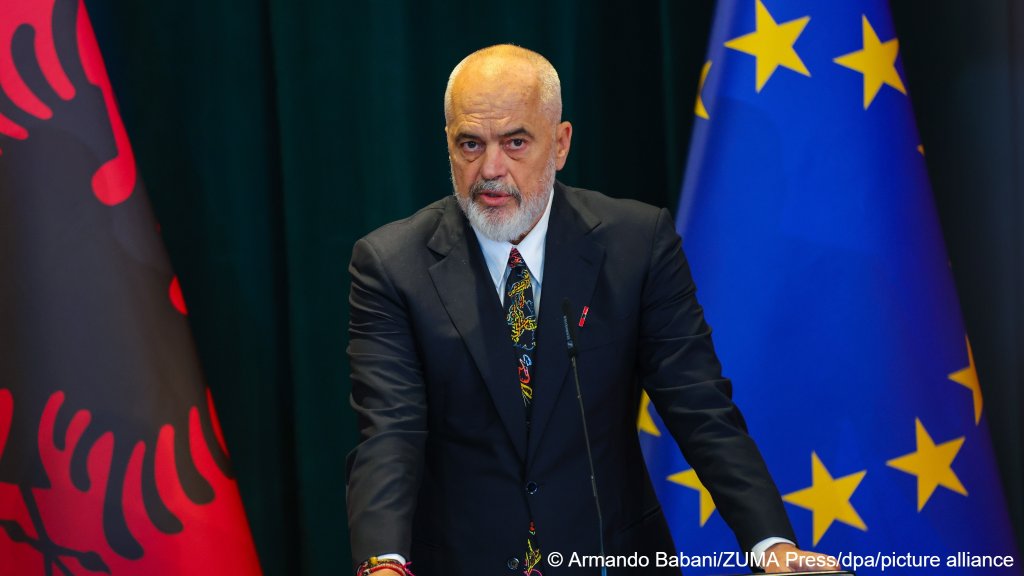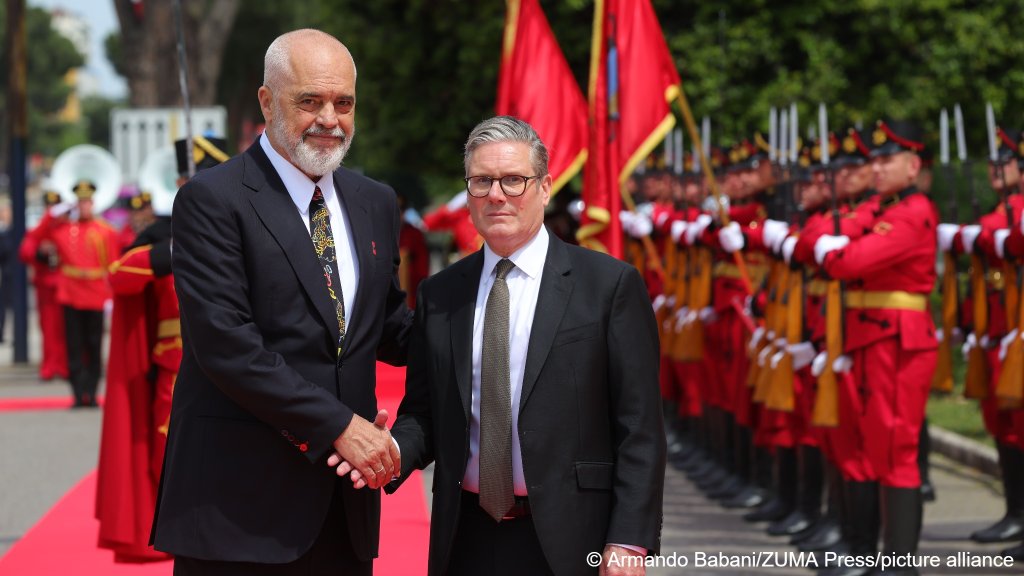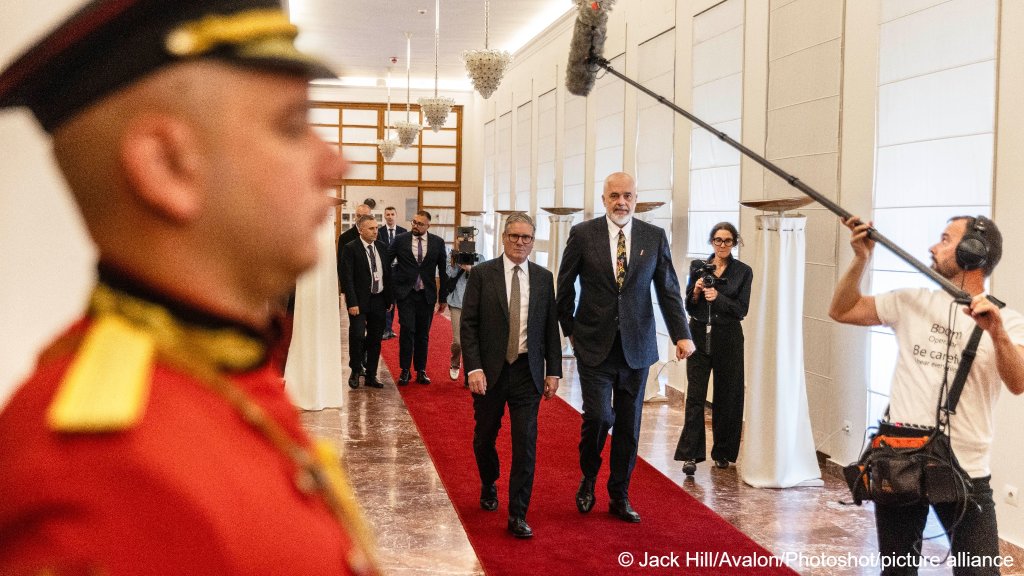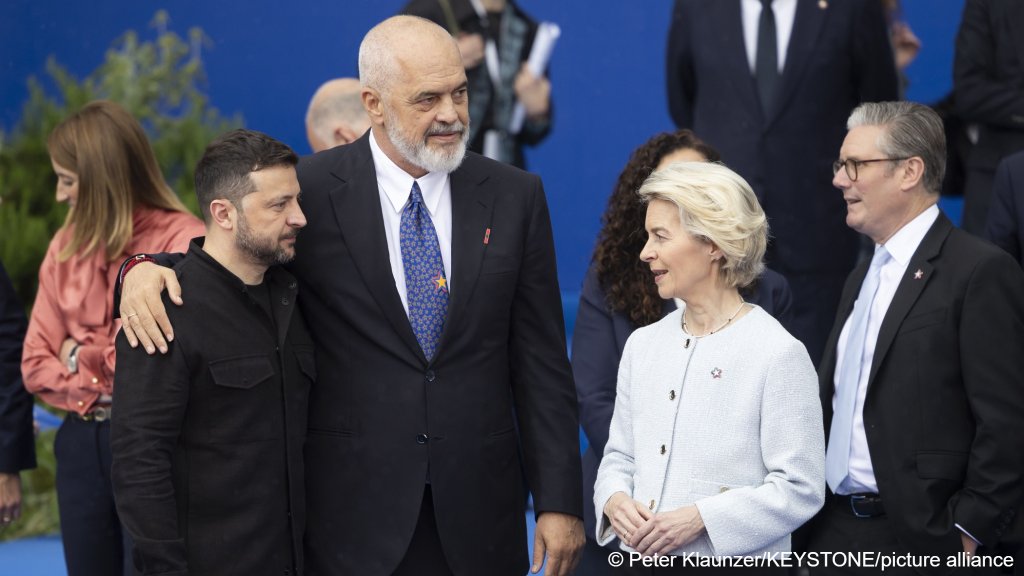While visiting Albania on Thursday, the British Prime Minister announced that the UK was looking to draw up agreements with several third countries that could host return hubs for asylum seekers refused the right to stay in Britain.
During a state visit to Albania, the British Prime Minister Sir Keir Starmer on Thursday (May 15) underlined that the concept of "return hubs" was "a really important innovation." The hubs, added Starmer, should help to effectively tackle irregular migration, reported the news agency Associated Press (AP).
"We are in talks with a number of countries about return hubs," Starmer told a joint news conference with his Albanian counterpart Edi Rama, who has just been elected for a fourth term of office. While Starmer did not name the countries he was in discussions with, Rama hastened to add that Albania would not be one of those countries hosting British return hubs, underlining that he had already turned down similar requests for similar deals with other countries and ruled out the possibility that the UK could send its rejected asylum seekers to Albania, reported AP.
In the last few months, other countries, including Sweden and the UK, have expressed interest in inking similar deals. Rama has so far underlined that the hubs he currently hosts are due to the special relationship Albania enjoys with Italy.
Read Also
UK's Starmer 'interested' in Italian offshore migration solutions

Italian centers in Albania
Albania has an existing five-year agreement with Italy to process the asylum requests of migrants in Albania under Italian jurisdiction. However, since signing that deal, which was meant to process around 36,000 migrants a year, only a few dozen migrants have actually been sent to Albania.
In April, the Italian government changed the agreement to make the Albanian centers a type of return hub for asylum seekers who had already been rejected by Italy. Earlier this week, the Italian news agency ANSA reported that there were 43 migrants currently in the Gjader center in Albania, awaiting deportation.
The idea of return hubs, explained migration expert Meghan Benton to AP, involves detaining and deporting people who have exhausted their asylum claims in a country. Benton is the Global Programs lead at the Migration Policy Institute think tank, and adds that the European Commission has also been positive about the theory of return hubs as a way to deter irregular migration.
Read AlsoUK: The end of the Rwanda plan
Starmer keen to show he can deal with migration and defend borders
Over the last few weeks, Starmer’s rhetoric regarding migration appears to have become sharper. Since suffering blows at the local elections at the beginning of May, and still less than a year into office, he is under pressure politically to demonstrate that he is able to deal with migration.
Having entered office and cancelled the former Conservative government’s Rwanda deal, which was about sending asylum seekers to Rwanda to have their claims assessed, and if granted, be hosted in Rwanda, Starmer’s government is now seeking to set up agreements that are not hugely dissimilar.
However, the Labour government is keen to underline that the third country return hubs would differ from the Rwanda plan because they are about sending people back who have already had their claim assessed and refused, not off-loading the responsibility of taking asylum seekers in Britain.
Read AlsoAlbania, Italy, UK: Leaders discuss migration accord, repatriations
Western Balkans programs to tackle migration
Ahead of Starmer’s visit to Albania, a British government press release underlined the continuing work the two countries are engaged in to tackle people smuggling in the Western Balkans area. "The UK will step up efforts to break the crime web fueling illegal migration across the Western Balkans on a historic visit to the region by the Prime Minister," reads the press release.
Starmer will "visit the port of Durres, to see firsthand how UK cooperation is intercepting people smugglers, deterring would-be migrants and snaring criminals using fake documents."

The press release claimed that the UK’s cooperation with Albania "has underlined how this government’s approach of intercepting and deterring migrants upstream can dramatically cut illegal migration to British shores."
The UK and Albania began signing agreements under the previous Conservative government to tackle migration, after there was an increase in the number of Albanians attempting to make the crossing from the French coast across the Channel to Britain. Once the agreements were signed, the number of Albanians crossing the Channel dropped from around 12,000 in 2022 to just 600 in 2024, reports AP.
Read AlsoAlbanian migrants paid by UK government to return home
Agreements reduce number of Albanian arrivals
Over the last three years, "there has been a 95 percent reduction in Albanian small boat arrivals…while the number of Albanians returned to the country has also doubled in the past two years, with 5,294 Albanians returned in 2024, more than double the 2,035 Albanian nationals returned two years earlier," states the press release. Albania is designated as a safe country by the UK and so Albanians cannot seek asylum in the UK.

While in Albania, Starmer was also expected to announce the expansion of the Joint Migration Task Force the UK has with Albania and Kosovo, to include North Macedonia. Starmer was expected to "further progress positive discussions with Montenegro," stated the press release.
The task force, states the press office, is designed to "detect, deter and manage illegal migration." The UK shares intelligence with local law enforcement so that they can intercept suspected smuggling gangs. UK drones are also deployed to allow local police to "snare gangsters funneling migrants through the Western Balkans corridor and on to the UK."
In the autumn, the UK will be hosting a summit of Western Balkan nations, "which is expected to focus on regional security, economic growth and tackling shared challenges such as foreign interference and illegal migration with innovative solutions."
Read AlsoModern slavery: Albanian migrants in UK back in focus
Preventing 'the revolving door effect'
Albania and Britain, announced Starmer, are also going to launch a new project to "tackle illicit finance and investigate underground finance streams that are laundering money between Albania and the UK."
The UK also announced they will be funding a new program to make sure that any deported migrants from the UK to Albania will be able to reintegrate into their home country and find meaningful employment, to avoid them falling prey to the "revolving door effect," where they are returned home "only to evade law enforcement and leave the country again," most probably to return to the UK.

The program will be focused on northern Albania, from where most migrants who arrive in the UK without papers can be traced.
Britain and Albania are also cooperating on a forensic evidence program, where they share the DNA swabs of criminals in Albania to allow them to solve crimes in the UK.
According to the British government, the "recent roll out of the program saw more than 55 serious criminals –including murderers, rapists and manslaughter offenders – taken off UK streets thanks to the closer cooperation between the two countries."
The British government has promised to invest a further one million pounds (around 1.18 million euros) to help upgrade Albania’s forensics, biometrics and digital capability to detect and detain further criminals and protect UK streets.
With Reuters and AP
